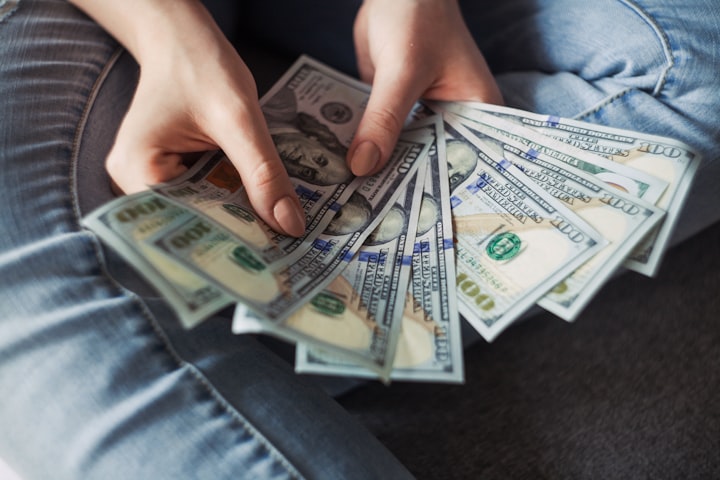There Really Is a Magic Money Tree (Of Sorts)
How banks make 1000% when they loan you moneyy

There is a saying,
‘It takes money to make money.’
— Origin unknown
It’s not true.
All you need is a reasonable idea and to roll up your sleeves and make it happen — unless you are a bank, then it is partially true. You see, banks can create money out of thin air.
It took me a magical second to appreciate the beauty of this idea. It took me a little longer to figure out a way to explain it to the kids.
Fred the Fisherman
Once upon a time, Fred was sitting on the bank of a river when a fish jumped out of the water and landed on his lap. It was a fortuitous moment for Fred was hungry. He took the fish home and cooked it for his dinner.
The next day, Fred returned to the river, waded out to the middle, and waited for the wriggling fish to leap over a step. It wasn’t easy to catch the slippery blighters, but he bagged two salmon. He ate one and sold the other to his neighbour for £10.
Fred used his £10 to buy a net. The next day, he caught ten fish. Within a couple of weeks, he had saved £1,000.
Fred didn’t want his money stolen, so he went to the bank, and the bank not only agreed to keep his money safe, it offered to pay him 5% interest on his money if he kept it in the bank for a year.
Fred felt delighted as he could save up and purchase a boat. He dreamed of going out to sea to catch more fish and, with the profits from those fish, he could buy an even bigger boat.
The bank took Fred’s £1,000 and promptly loaned it out to Joe, who needed the money to buy a car to travel to his new job in the city. Joe agreed to pay the bank the money back from his wages plus 10% interest.
Joe used his loan to pay Arnold in exchange for his car and Arnold wanted to keep his money safe, so he went to the bank and deposited it there. The bank did what they do and loaned that £1,000 out to another customer.
All very simple.
Except, if you think about it, the same £1,000 that the bank loaned to Joe is the same £1,000 deposited by Arnold. And that £1,000 is going out to do the rounds again.
They could end up being owed £10,000 in loans, all from the original deposit of £1,000, meaning they have created £9,000 from thin air.
The Magic Money Tree
The above is a simplified version. In reality, there are constraints placed on the bank by the government.
The bank has to keep 10% of the original deposit in case depositors want to withdraw their money. But they are allowed to loan out ten times the amount of cash originally deposited.
When added together, this makes a significant amount of money for the banks to manufacture more. Savings statistics for 2022 from the Bank of England show that in the first ten months of the year, people deposited £55 billion into banks and building societies in the UK alone.
The bank trusts the borrower, Joe, to pay back the loan. Since Joe is working, he can afford to pay it back.
Money isn’t being created out of thin air, it’s created by typing numbers into a computer — some might call this magic, economists call it accounting.
Most of the money we use comes in digital form, as the numbers we see on our bank statements. Banks create this money when they make loans.
Sound unbelievable?
“In the modern economy, most money takes the form of bank deposits. The principal way in which they are created is through commercial banks making loans: whenever a bank makes a loan, it creates a deposit in the borrower’s bank account, thereby creating new money.”
— Bank of England
Unfortunately, banks lend most of their money for the purchase of property and financial speculation. This leads to higher house prices and increases the likelihood of financial crises.
Banks do an awful job of lending to the businesses that are creating the jobs. This is the only way to sustainably grow the economy.
The financial crash in 2008 was a prime example. Banks were greedy. They had so much money they loaned it to any Tom, Dick, or Harry. Regrettably, Tom lost his job, Dick’s business went bankrupt, and Harry fled the country to avoid his racist family.
The banks didn’t like being bitten on the backside — even when it was them doing the biting, so they were slow to lend again. The Bank of England stepped in with a money creation programme called quantitative easing. It pumped new money into the financial sector, which pushed up the value of assets like houses, shares, and bonds.
This policy did nothing for ordinary people. Politicians used the absence of a “magic money tree” to justify austerity. Meanwhile, the Bank of England policies enriched the wealthy few. The Bank of England’s own research showed that quantitative easing made the richest 5% over £128,000 richer.
The Wealth of Nations
It took the banks 300 years to manufacture the first trillion-pound economy. It took only eight years for them to manufacture the second trillion.
All it would take is for another crisis to happen, for Fred’s river to dry up with fish because of the poison our water companies are pouring into it, for Joe’s job to get lost to A.I., and for Tom, Dick, and Harry to go to the bank to remove their deposits and the bank would fail.
They can’t dish out money they haven’t got.
Rather than injecting money into financial markets, banks should use their funds for spending on infrastructure, green technology, and investment in jobs to improve everyone’s financial situation, not just the rich.
Banks need to lend money to support investment and jobs in the real economy. Let’s go back to bustling branches filled with the sound of transactions and conversations between clients and staff, please. Fill the air with the crisp scent of money as it circulates through the hands of those seeking loans for productive purposes.
Stuffing money into the pockets of the rich doesn’t trickle it down. It does the opposite. It allows them to buy up all the land and all the property and make it so expensive that the average Joe finds it hard to put a roof over his head.
I read an article the other day about how a person earning £100,000 per year can pay the same amount of money in tax as a person earning £12,500 using legal tax avoidance schemes.
Records show Donald Trump paid $750 in federal income taxes the year he won the presidency and $750 in his first year in the White House. He paid no income taxes at all in 10 of the previous 15 years.
Tax the rich, I say. Cut off their tax avoidance schemes. Put their money to work. Put it back into the system that helped create their wealth. Make the world a better place for everyone.
About the Creator
Malky McEwan
Curious mind. Author of three funny memoirs. Top writer on Quora and Medium x 9. Writing to entertain, and inform. Goal: become the oldest person in the world (breaking my record every day).






Comments (3)
Well done, very insightful. 😀
it's well-written and full of valuable information.
"Banks were greedy. They had so much money they loaned it to any Tom, Dick, or Harry. Regrettably, Tom lost his job, Dick’s business went bankrupt, and Harry fled the country to avoid his racist family." Lol, that part made me laugh so much! Also, thank you so much for that example in the beginning using Fred, Joe and Arnold!